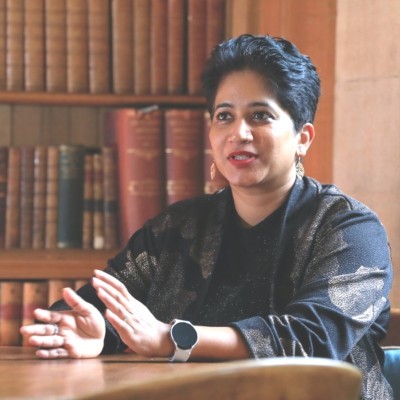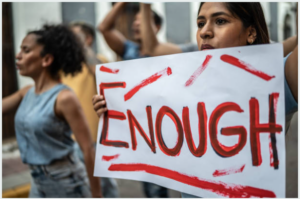- English
- DEUTSCH
- SPANISH
- FRENCH



On the occasion of International Women’s Day, we sat down with Lysa John, Executive Director of the Atlantic Institute, to discuss the challenges and opportunities facing women’s rights in today’s complex global landscape. Lysa is a passionate advocate for human rights and gender equality.

… Lysa articulated – “The one thing organisations talk about least is their values. One of the best phases of my life was working for Yuva in Mumbai. We constantly discussed values and how they related to our view of the world and our work – it was fundamental to our language about projects and research.”
“Sadly today, the values debate has become so extreme that it’s difficult to ground yourself and talk about the values you’re showing up with. Does this work and workplace speak to my values? The good news is that many young people in activism are creating non-traditional spaces where this debate thrives.”
“It’s not just about values published on a website – it’s about having a constant dialogue about values in practice. These conversations get shut down when people feel it’s risky; there’s a lot of anger and emotion around issues like Gaza and Sudan. But we can’t work for equity if we can’t have difficult conversations – if we don’t have the language and tools to navigate those conversations.”

Looking at women’s rights from a macro perspective, Lysa pointed out that there is a tangible connection between democracy and women’s rights. “When we see backsliding in democracy, women and LGBTQ+ groups are invariably affected. Look at the culture wars in the US – attacks on abortion rights and other issues. Women’s rights are used to polarise communities and assert a masculine, militaristic form of government. Democracy involves participation and consultation, which is often seen as very feminine and goes against strongman politics and culture. An attack on one usually means an attack on the other.”




However, the political threat is not the only global challenge to women’s rights Lysa highlighted. “When we talk about women’s rights, it’s not one monolithic issue. There are so many strands around moral and cultural space, political participation, and women in work.”
“40% of women don’t have access to the internet – something we don’t think about much. Most women globally are employed in the informal space, which leaves them constantly vulnerable. One in ten women lives in extreme poverty, directly linked to gender. Women are the largest proportion of migrant workers and provide the highest and most regular levels of remittances.”
… the largest form of transfers for those in need comes through remittances, with women being the largest ‘donor’ group. Despite facing so many structural setbacks to their progress, they’re still committing and investing in communities and societies.”
However, there is still hope and despite the current challenges, there has been progress made – “There’s a lot of backlash and bad news around women’s rights. But it’s also true that it’s the most persistent movement around advancing rights in very tangible ways. Issues around reproductive rights become controversial and polarising, but they also generate an equal amount of energy to move rights forward, to fight back.
“The articulation of workers’ rights was non-existent before. It’s similar to the climate movement today – headlines focus on losses, but there’s tremendous work happening on the ground.
“The CIVICUS Monitor identifies bright spots every year – advances in women and gender justice, primarily through legislation and litigation. We’re fighting a culture war around societal norms; our biggest resource is codifying progressive norms. But you need behavioural change alongside laws, whether addressing gender-based violence, equal pay, or protection in various environments.”
Lysa’s words remind us that International Women’s Day is not merely a celebration, but a recommitment to the ongoing work of justice. Her insights offer a clear-eyed assessment of current challenges and the historical perspective that gives us the courage to continue.
Interview with Shivani Smith, Partner & Sector Lead, Social Impact & Environment (UKAME) and Arshya Dayal, Senior Research Associate (UKAME)
Shivani is Partner & Sector Lead, Social Impact & Environment, UKAME.
She has experience of senior charity roles including Director and Chief Executive positions for organisations across the UK. Previously she has worked with non-profits on projects covering qualitative research, brand, fundraising, leadership development and CSR. Her experience of the non-profit sector also includes voluntary roles within charities as a Chair and as a trustee.
Shivani has an MA Public Policy and Management, University of York and a BSc Sociology (Hons), London School of Economics and Political Science.